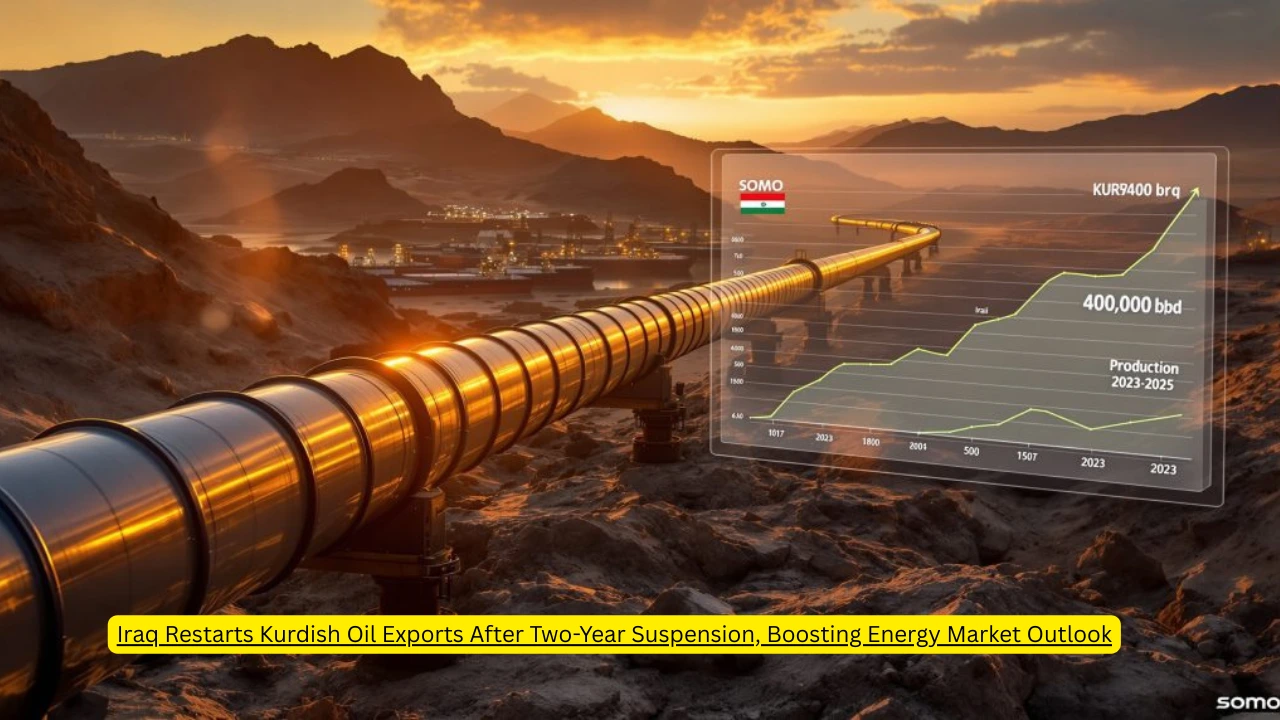Introduction
In a significant development for the global energy market, Iraq restarts Kurdish oil exports after a two-year suspension, a move that is expected to stabilize supply chains and strengthen Baghdad-Erbil relations. This resumption marks a turning point in Iraq’s domestic energy policies and its role in the international oil trade.
Background: Why Were Kurdish Oil Exports Halted?
In March 2023, Kurdish oil exports through the Turkey-based Ceyhan pipeline were suspended following a legal dispute between Baghdad and Erbil. The International Chamber of Commerce (ICC) ruled that Turkey had violated agreements by allowing Kurdish authorities to export oil independently, bypassing Iraq’s federal government. This triggered a two-year halt that cost both Iraq and the Kurdistan Regional Government (KRG) billions of dollars in revenue.
The Significance of Kurdish Oil Exports
Kurdish Oil Exports account for a substantial share of Iraq’s overall oil output. Before the suspension, the Kurdistan region exported nearly 450,000 barrels per day (bpd) through the pipeline to Turkey. These exports were not only vital for the Kurdish economy but also contributed to Iraq’s status as one of the top oil exporters globally.
- Economic Dependency: The KRG heavily relies on oil exports for public sector salaries, infrastructure development, and foreign investments.
- Energy Market Balance: With global demand for energy rising post-pandemic, the absence of Kurdish oil added pressure on international markets.
- Geopolitical Importance: Kurdish oil plays a key role in Iraq’s federal-union dynamics and its diplomatic ties with Turkey.
The Recent Agreement Between Baghdad and Erbil
After months of negotiations, Baghdad and Erbil reached a new revenue-sharing agreement to ensure transparency and accountability. The deal allows Kurdish oil to flow through the Ceyhan pipeline again under the supervision of Iraq’s State Organization for Marketing of Oil (SOMO).
Key points of the agreement include:
- Oil revenues will now be deposited into a single federal account.
- The Kurdish region will receive its agreed share of the federal budget.
- Disputes over independent Kurdish oil contracts will be reviewed in line with Iraq’s constitution.
Global Energy Market Outlook
The resumption of Kurdish oil exports comes at a critical time when global markets are grappling with supply shortages due to geopolitical tensions and production cuts by OPEC+.
- Stabilizing Supply: Around 400,000–450,000 bpd entering the market will help balance supply and demand.
- Impact on Prices: Analysts predict oil prices may slightly ease in the short term as additional barrels enter global circulation.
- Investor Confidence: The resolution between Baghdad and Erbil sends a positive signal to foreign investors interested in Iraq’s energy sector.
Regional and Political Implications
The restart of Kurdish Oil Exports also carries political implications:
- Strengthened Baghdad-Erbil cooperation may reduce internal disputes over resource management.
- Turkey benefits by reactivating the Ceyhan pipeline, enhancing its role as a regional energy corridor.
- The deal could set a precedent for resolving other resource-related disputes within Iraq.
Challenges Ahead
Despite this breakthrough, challenges remain:
- Political tensions between Kurdish parties and the federal government could resurface.
- Transparency in revenue distribution must be maintained to avoid corruption and mistrust.
- Regional security concerns, including instability in northern Iraq, may disrupt smooth oil flows.
Public and Market Reactions
Reactions to the restart have been largely positive:
- International Oil Companies (IOCs): Welcomed the clarity and new agreements, which allow them to resume halted projects.
- Global Markets: Responded with optimism as traders expect improved supply stability.
- Iraqi Citizens: Hopeful that increased revenues will translate into better public services and economic development.
Conclusion
The fact that Iraq restarts Kurdish oil exports after a two-year suspension is a landmark achievement for Iraq’s economy and political stability. It reflects the interconnected nature of domestic politics, international law, and global energy dynamics. Moving forward, the success of this deal will depend on transparency, consistent cooperation, and effective governance. The return of Kurdish oil to global markets not only boosts Iraq’s economic outlook but also offers relief to an energy-hungry world.Read more about “Maryam, Bilawal row over flood relief efforts in Punjab“



2 thoughts on “Iraq Restarts Kurdish Oil Exports After Two-Year Suspension, Boosting Energy Market Outlook”